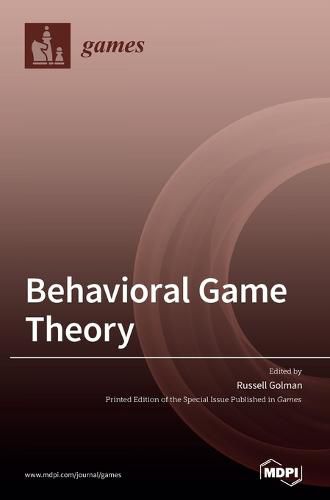Readings Newsletter
Become a Readings Member to make your shopping experience even easier.
Sign in or sign up for free!
You’re not far away from qualifying for FREE standard shipping within Australia
You’ve qualified for FREE standard shipping within Australia
The cart is loading…






This title is printed to order. This book may have been self-published. If so, we cannot guarantee the quality of the content. In the main most books will have gone through the editing process however some may not. We therefore suggest that you be aware of this before ordering this book. If in doubt check either the author or publisher’s details as we are unable to accept any returns unless they are faulty. Please contact us if you have any questions.
How do interacting decision-makers make strategic choices? If they’re rational and can somehow predict each other’s behavior, they may find themselves in a Nash equilibrium. However, humans display pervasive and systematic departures from rationality. They often do not conform to the predictions of the Nash equilibrium, or its various refinements. This has led to the growth of behavioral game theory, which accounts for how people actually make strategic decisions by incorporating social preferences, bounded rationality (for example, limited iterated reasoning), and learning from experience. This book brings together new advances in the field of behavioral game theory that help us understand how people actually make strategic decisions in game-theoretic situations.
$9.00 standard shipping within Australia
FREE standard shipping within Australia for orders over $100.00
Express & International shipping calculated at checkout
This title is printed to order. This book may have been self-published. If so, we cannot guarantee the quality of the content. In the main most books will have gone through the editing process however some may not. We therefore suggest that you be aware of this before ordering this book. If in doubt check either the author or publisher’s details as we are unable to accept any returns unless they are faulty. Please contact us if you have any questions.
How do interacting decision-makers make strategic choices? If they’re rational and can somehow predict each other’s behavior, they may find themselves in a Nash equilibrium. However, humans display pervasive and systematic departures from rationality. They often do not conform to the predictions of the Nash equilibrium, or its various refinements. This has led to the growth of behavioral game theory, which accounts for how people actually make strategic decisions by incorporating social preferences, bounded rationality (for example, limited iterated reasoning), and learning from experience. This book brings together new advances in the field of behavioral game theory that help us understand how people actually make strategic decisions in game-theoretic situations.